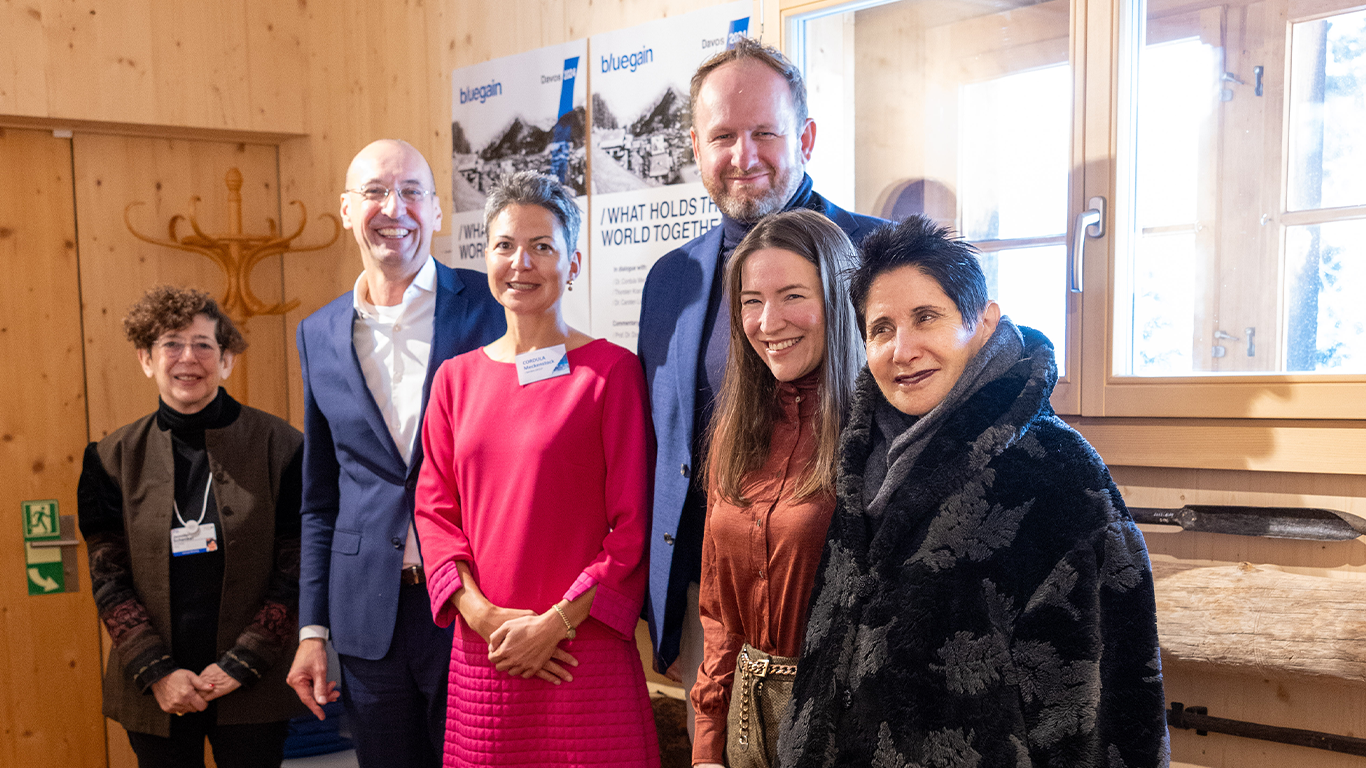

WEF 2024 Recap
/ Behind the Curtains of WEF Davos 2024 by bluegain – The most Political Davos for Years
In his speech, the President of Ukraine, Volodymyr Zelenskyy, invited countries that respect peace and international law to a global peace conference organized by Switzerland. The Hamas attack on Israel were also on the agenda and UN Secretary-General António Guterres and French President Emmanuel Macron, called for a ceasefire in the Gaza Strip.
Bank President Christine Lagarde on Friday said that Europe must go on the offensive in the face of a potential return of Donald Trump to the White House. The President of the World Bank Ajay Banga, and the IMF Managing Director, Kristalina Georgieva, emphasized the need for collective action when it comes to tackling climate change.
/ BUSINESS LEADERS DISCUSS TECHNOLOGY THIS YEAR
Not only does the World Economic Forum draw prominent figures from the political sphere, but also players from the business world, including individuals at the helm of some of the most dynamic and innovative companies. Naturally, AI was at the center of discussion. With GenAI, we have entered the next phase of technology-induced exponential growth, especially with the opportunities of automation-augmentation-combinations. Data is lifeblood of AI, which puts organizations at a crossroads; those who organize their data and algorithms effectively gain an edge, while others risk falling behind. Sam Altman, the CEO of OpenAI said that AI technology is powerful and society must now develop together with it. We also have to deal with Triple D – disinformation, deep fakes, discrimination at large scale. Going forward, AI knowledge is crucial – not only for the elites, but also for general public.
/ OUR CXO LUNCHEON – WHAT HOLDS THE WORLD TOGETHER?
In the midst of the World Economic Forum, our bluegain Luncheon event took place at the beautiful Heimatmuseum in Davos, where an exclusive group of 25 CEOs, CFOs, CIOs, CDOs, CSOs, Chief Privacy Officers, and Academics gathered. For those who could not join us, we have summarized the content.
The first participants arrived at 12 noon, so we had the opportunity to network and exchange ideas even before lunch. After everyone was energized, Jennifer Schenker, Editor-in-Chief for the Innovator, who moderated all sessions, asked to take the stage as the first speaker.
Dr. Cordula Meckenstock, Chief People, Culture & ESG Officer at BayWa, emphasized in her insightful presentation the importance of changing perspective on sustainability, moving from a reporting driven and undirected set of individual measures towards an entrepreneurial approach, that implements impact-driven projects in the business model. Companies can achieve this by defining core business areas, baselining and target-setting, creating a roadmap with measurable metrics, continuing to do what works, phasing out what doesn’t, and taking the people of the company with on the journey. She differentiated between three categories of ESG projects: First, there are projects that add value to a product by making it more sustainable and therefore more desirable to consumers. Secondly, there are social impact projects that contribute to society and the environment. Finally, there is footprint management, where companies ask themselves how they can produce the same value with less environmental impact. To illustrate her point, she shared an example of how her company trades in wheat that uses smart irrigation systems and where carbon capture takes place, making each company involved more sustainable.
Next on stage was Thorsten Kranz, Head of Artificial Intelligence Solutions at DHL, who shared how AI helps ‘building bridges’ at DHL and in the world, while not losing sight of ethical aspects and the human being. In this sense, DHL is not just focusing on mathematical route optimization with AI, but also values the experience of the employees, because of course other factors than pure travel time are at least as important in their work. By doing that, DHL has a much longer tenure with all their couriers. In the increasingly complex world with more and more regulations, DHL uses AI to make shipping easier and cheaper for the parties involved. More generally, AI does not only help to cross physical borders, but also cultural borders, for example by translating with a human touch and in real time, thereby connecting people from different cultures. While AI has many positive aspects, Thorsten Kranz also warned about the potential misuse of AI, such as deepfakes, where politicians say something in their own voice, that they actually never said. Bots that influence elections by posting on social media also pose a threat, especially, since with every day it gets harder for companies like Meta to distinguish between bot comments and real comments. Furthermore, Thorsten Kranz stressed the importance of making sure that the massive wealth that will be created by AI will benefit society as a whole and not just a few individuals and encouraged everyone to contribute to help promote the good side of AI, even with small decisions.
Dr. Carsten Linz, CEO at bluegain and member of the WEF Network on Digital Economy, gave impulses on the topic of the Interconnectedness of the 3 Grand Transformations for Global Progress, starting by highlighting key concepts for each Transformation. In terms of Digital Transformation, many companies still do not see digital as the means to an end, and do not reimagine their processes to make their transformation use case specific. Similarly, in their Sustainability Transformation, organizations take a risk mitigation perspective instead of developing a portfolio of impact programs that make sustainability and circularity an integral part of their value creation fabric. When it comes to Business Model Transformation, 80% of companies fail, because the transformations are ‘lopsided’ and the areas lagging behind make the others flip back. Or in other words: There is an opportunity for successful transformation when all parts of the value chain are transformed coherently. Putting all three transformations together, Dr. Carsten Linz highlighted the importance of understanding the cause-and-effect relationship to enhance impact and accelerate transformation speed. There are many examples of organizations successfully driving the transformations together. Siemens emulated an entire factory with a digital twin and the result was not only an efficiency gain, but also that the factory became carbon neutral eight years in advance before the original target. Sustainability Transformations often also impact the business model. Phillips, for example, offers circular lighting as a service for airports, which means that they guarantee lumen at every place at the airport, instead of selling lamps. In the end, it is on us, to ‘explore, dream, discover’.
Last but in no way least, Prof. Doris Sommer, Professor at Harvard University and Director of the Cultural Agents Initiative, gave a perspective on art and culture as drivers of paradigm change in a very engaging presentation. She told us about a management model using the analogy of jazz icon Miles Davis and how he and his fellow talented musicians made music together. Miles Davis became very famous very early on and was able to hire the most virtuoso jazz musicians. These musicians wanted to outdo each other, which didn’t stop them and Miles Davis from being successful, but one particular change in management really made his career take off. That was when he told the musicians to play less complicated music so that they could listen to each other more. Prof. Doris Sommer concluded from this that creating a culture that respects people’s abilities and their autonomy leads to better results as well as longevity in the workforce. French philosopher Emmanuel Lévinas aptly distinguished between ‘what is said’ (‘le dit’) and ‘how it is said’ (‘le dire’). The latter is even more important, in the transformative system that is education and working together, because it is in the way we interact that we can foster collaboration and respect. Art is not just collectible pretty things or investments, but powered transformation.
A big thank you to the amazing speakers, to those that helped organizing and everyone that joined us to be a part of our CxO Luncheon Event to make our dialogue – at the intersection of Artificial Intelligence, Sustainability Transformation, Digital Innovation, and the Humanities – so meaningful and charted a course for transformation.
/ #WEF24 – IT IS A WRAP
Looking back, the WEF Annual Meeting 2024 truly was a great success in many ways: Over 350 heads of state, government and ministers came together in these difficult times to make progress on advancing climate action, strengthening the global economy, and building resilience. Business and tech leaders jointly discussed how generative AI will impact our lives and how to make it a positive impact. And on a personal level: Coming together in Davos, meeting old and new friends, exchanging ideas or ‘just’ sharing a laugh, that is what holds the world together.
/ ABOUT THE AUTHOR
- Dr. Carsten Linz is the CEO of bluegain. Formerly Group Digital Officer at BASF and Business Development Officer at SAP, he is known for building €100 million businesses and leading large-scale transformations affecting 60,000+ employees. He is represented on boards including Shareability’s Technology & Innovation Committee and Social Impact. A member of the World Economic Forum’s Expert Network, Dr. Linz is also a published author who shares his expertise as an educator in executive programs at top business schools.
/ download WHITEPAPER
Empowering you with knowledge is our priority. Explore our collection of well-thought-out whitepapers available for download. Should you have any questions or wish to explore further, our team is here to assist you.
download


 back to Article
back to Article